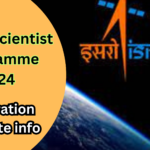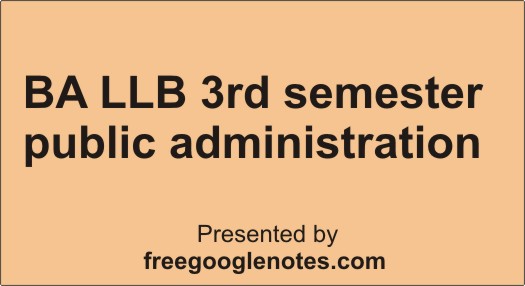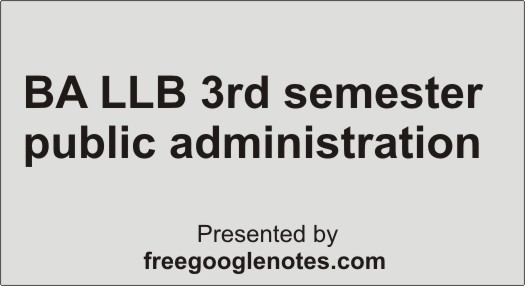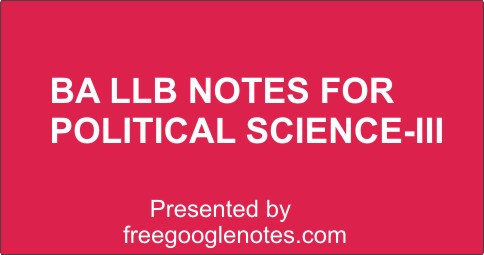BA LLB 1st year political theory practice question answer papers:In this post you will read about What is democracy? What are its different forms ? Discuss its strength and weakness,
Table of Contents
DEMOCRACY
Q. 1. What is democracy? What are its different forms ? Discuss its strength and weakness.
Ans. It shall be absolutely wrong to say that origin of democracy lies in any of the modern institutions. It is in fact one of the oldest institutions in the world. We find that city states, in the times of Aristotle and Plato, practiced this. It was also in practice in some parts of India in the ancient times. Roman empire at the time of its glory also knew and followed it. It, however, got eclipsed in the Middle Ages but emerged with more energy, vigour and force in the writing of Rousseau. Since then it is very rapidiy progressing. There is perhaps now no institution in the world which is not actually running or professes to be running on democratic lines.
The word ‘Democracy’, is derived from Greek words ‘Demos’ and ‘Cratio’ which respectively mean ‘people’ and ‘power’. In other words to the Greeks it meant a form of government in which power was vested in the people. In the Middle Ages it was a reaction against the consolidation of power by the feudals, deposts and the church. With the progress of industrialisation, this institution was used as a check against industrial magnates in practicular and capitalists in general. In 19th century it become symbol of struggle against all types of aristocracies in all walks of life. Today democracy is the only hope of depressed class who find in it signs of their welfare. It gives them hope and right of self-expression and thought to be the only suitable form for imparting political education to the millions.
Definition of Democracy : Various definitions of democracy have been put forth by various thinkers to depict its true characteristics. Seeley has said that it is a form of government in which everyone has a share.’ Byrce has said that it is a form of government “in which will of the majority of qualified persons rules.” According to Dicey in this form of government, “the Governing body is a comparatively large fraction
of nation.” Herodotus has said that democracy means authority “in * communities which act by voting that rule belongs to the majority, as no
other method has been found for determining peacefully and legally what is to be declared the will of a community which is not unanimous.” According to Gettell, “Democracy is that form of government in which the mass of population. possesses the right to share in the exercise of sovereign power.” But the most suitable and acceptable definition of democracy is that of Abrahm Lincoln, who defined it as : “Government of the people for the people and by the people.” Thus according to this definition it is assumed that in a democracy (a) Sovereignty resides in masses, (b) Government is based on the consent of people, (c) All adult citizens have the right to vote and to stand for elections as a candidate, (d) Government is responsible for looking after the welfare of the community as a whole, (e) According to certain means which are devised by the Government, the people remain in constant touch with the authority which frame policies and (f) The people are given certain fundamental rights which are justiciable in courts of law.
Democratic State, Government and Society : Democracy is not only a form of government but also a type of state as well as society. A democratic state is one in which ultimate sovereignty is vested in the people who have a right to change the government and have active participation in the final formulation of policies. It is hoped that a democratic state will have normal government though it is not always so. There are cases when democratic states have decided to have non-democratic governments e.g., Britain and U.S.A. which are considered citadels of democracy, had practically non-democratic governments during 2nd World War.
A democratic government is one in which the majority party governs and continues to govern as long as the people express confidence in it. In this form of government, every citizen has a share in the formation of government.
A democratic society is understood to be one in which there is a sense of equality and in which economic, social and political disparities do not retard the progress of members. In this society, the people are not judged by the wealth but by the qualities which they have. In such a society there is no distinction of caste, color and creed. In it there is faith in the personality of man. In fact it is the democratic society which is responsible for healthy democratic government and state.
Forms of Democracy : Democracy is of two types namely (a)
Pure or direct democracy, (b) Representative or indirect democracy which may briefly be discussed as under :
(a) Pure or direct Democracy : A pure or direct Democracy is one in which the people directly participate in their own affairs, ie, in the formation of policies. They speak for themselves and do not require the assistance of representatives to speak on their behalf. According to Garner, “A pure democracy so called is one in which the wills of the state is formulated or expressed directly, or immediately through the people in mass meetings or primary assembly, rather than through the medium of delegates or representatives chosen to act for them.” Such a type of democracy is possible only in small states where the people can assemble at one place to express their will. It was being practised in Greek city states and today is being practised in Switzerland where devices of Referendum, Recall and Initiative have been introduced for ascertaining the wishes of the people.
(b) Indirect or Representative Democracy : It is a form of democracy in which representatives of the people duly elected by them speak on their behalf. The people, as such, have no right to participate in the administration. They are required to get in touch with their representatives, and let them know their view point and ideas. The elected representative shall only have the right to speak for his constituercy. According to Garner it “is that form in which will of the site is formulated and expressed though the agency of relessly ‘small and selected body of persons chosen by the people to act as their representative. It is based on the idea that while the people cannot actually be present in person at the seat of governient they are considered by the present by proxy.”
These days this type of democracy is the most well known and is prevailing in almost all democratic countries. It is because modern states have vast areas and population. It is usually impossible to make them together, more particularly when law-making process is going on.
Merits or strength of Democracy : (i) It is a form of government in which ultimate sovereignty vests with the people. They are ultimately to decide the nature of laws which they are to obey. They are the masters and thus enjoy maximum liberty. According to Gettell, “It assumes political equality and denies that any class shall possess special political privileges or monopolize political power.”
(ii) It is the form of government in which there is no possibility of violence. The people have always right to change the government by.
peaceful means. It is rightly said that democracy believes in ballots rather then bullets.
(iii) Democracy has faith in the capacity of people to govern themselves. Accordingly people develop a sense of self-confidence. Gettell has rightly said that “It has confidence in the capacity of people. to govern themselves and bases authority on the consent of governed.”
(iv) It is the form of government in which people get intellectual development and they rise from narrow outlook of egoism and try to promote national character and patriotism.
(v) It is the form of government which looks after the welfare of all classes of people because the government is ultimately responsible to the people as a whole and not to any particular community or class of people. They fear that their neglecting the people or a class of people can do them harm at the time of next elections. Gettell says, “It alone provides of the responsibility of those who are governed and results in a policy aimed at the welfare of all.”.
(vi) Democracy is the form of government in which people are called upon to cast their vote. Thus every political party arranges meetings and educates the masses about living political issues. Thus people get educated and remain in touch with day-to-day political problems.
(vii) Since the people themselves make laws, they feel that they are their own law makers. They also feel that since they have themselves made the laws there is no justification in their breaking those laws. There is thus very little possibility of breaking the laws and chances of committing crimes are minimised.
(viii) Since everything is done in the name of people, the masses feel that they are everything in the country. They also feel that this is their land. There thus develops a sense of patriotism even in common man. He develops love, affection and sense of duty towards this own country and gets ready every time to sacrifice his life and property for the motherland.
(ix) It is a form of government which is self-corrective. One an error is committed, a lesson is learnt and effort is made to rectify the mistake. It is, in other words, a method of trial and error in which corrections are not made by any outside authority but from inside by the masses.
(x). In this form of government there is the possibility of fixing responsibility on some one. There is a government which has won the
confidence of the people on account of certain programme which it had presented to the electorates at the time of general elections. The government has un-restrained powers to implement the schemes almost without checks. It wins honours for success and is held exclusively responsible for its failures.
(xi) It is considered to be the most efficient form of government because here the executive government tries to finish the work promptly and efficiently in order to win the favour of the people to whom they are ultimately responsible. … Gettell has summed up the advantages of democracy by saying that. “The ideals of democracy have been widely and enthusiastically accepted in the modem world. They have unquestionably aided in improving in many ways the position of masses, and whatever their defects, they will be difficult to replace, since people who have once tasted power are not willing to give it up without struggle.” .
Weakness or Demerits of Democracy : Whereas democracy has certain advantages, it has its disadvantages too. The critics point out that :
(i) In a democracy there is no secrecy. Everything becomes public in it and as such it is not possible to act and execute plans before their becoming public. In many of the cases it is not in the national interest to discuss a problem in public with the result that democratic governments have no national secrecy and thus unable to face a clever foe.
(ii) It is a form of government in which there is no place for quality. The heady are counted, not weighed. The vote of a man having keen interests and understanding of politics has the same values as the vote, of a disinterested layman.
..(iii) Democracy has been called the cult of incompetency because in his form of government it is not possible to take quick decisions. Much of the time is wasted in criticism and crossing the various stages through which a bill should pass before it becomes an act.
(iv) This is a costly from of government. After regular-intervals elections are to be conducted and each elections means expenses which a poor nation like India can ill afford. In addition to this, the people who are already over burdened with taxes do not react favourably to this type of expenditure.
(v) Here every man is treated as ‘equal’, ie, having equal qualities and capabilities but in actual practice it not so. We cannot ignore the
influence of biology on the development of man. In our day-to-day life? we come in contact with persons of different qualities, capabilities and characters and thus to treat them all equal is basically wrong.
(vi) It is a form of government to which the psychologists take objection. They feel that here the individual has his reasonings and arguments submerge in an appeal from the platform, as a matter of: respect to the personalities and also to symbols and slogans. Individual members kill their conscience in order to obey party discipline. Thus psychologically it is not welcome.
(vii) It is a type of government which is called ‘the Government by amateures’. The people who are returned in elections either due to their social influence or the influence of castes, etc., are quite fresh. They have no experienced and do not know the technicalities of administration. They are quite fresh and thus follow the method of trial and error which no nation can afford at any cost.
(viii) It is alleged that it is government be mediocres. Able persons with qualities of administration and those who are well off do not like to throw themselves in the mud and dust of election. It is accordingly a government of demagogues, and opportunists. Only those who have the art of speaking can capivate the feelings of masses and can command their faith. The people listen to speakers with more attention than to a sincere worker having unquestionable loyalty towards his nation but not having the art of delivering a speech.
(ix) an integral part of democracy is party system, without which it cannot function. Accordingly it inherits all the defects of the present party system.
(x) ‘According to Bryce, in this form of government politics becomes a trade, administration extravagant, and it ignores administrative skill, over stresses the role of parties and legislation is perverted either with money or the laws are bargained for votes
Conclusion : Till sometime past it was usually believed that democracy is the best and ideal form of government. But this idea is gradually vanishing and defects of democracy are now coining to the force. The people have now begun to realise that democracy has begun to play in the hands of only a few who rule and dictate the nation as they like. The capitalists and those having money are in a better position to mould public opinion in their favour. They also control the press and platform. In addition to this, the elections are a very costly affair and the poor man whose cause democracy claims to champion, goes
in the background. In a netshell it can be said that democracy is not without its evils. Evils were in the past as well bu: these have come to the front more glaringly in recent times alone.
Future of Democracy : Democracy is a hold experiment in world history. No doubt it suffers from defects but as has been pointed out by some of the eminent thinkers the defects are not in the institution but in the persons who have power to administer it. The world has already tasted other forms of governments including monarchy and dictatorship and it has been found that these do not suit the convenience of the masses. The future of democracy is not only bright but it is quite safe. It is the only hope of world for bright but it is quite safe. It is the only hope of world for bright and stable government. It is most suited to the people because the world has already seen two world wars and their havoc. It is feared that if national, as well as international disputes are not settled by peaceful means then the third world war might the still more destructive and might even wipe out the humanity. Democracy alone provides settlement of problems by peaceful means.
Q. 2. Discuss the merits and demerits of Democracy.
Ans. Democracy has entailed all types of criticisms. Its apologists raise it to the mystical heights whereas it opponents dub it as the most obnoxious type of government. In fact, both go to the extremes. Democracy has certain very striking advantages to its credit though it is not immune from some of genuine defects. We enumerate its merits and demerits in the following sew paragraphs. Merits of Democracy
(1) Saviour of individual’s liberties – Democracy is only form of government which assures liberty to the people by incorporating them in a regular chapter of rights or guaranteeing them throught, courts of laws. Freedoms of though, expression, belief and of forming associations are some of the fundamental rights which every democratic government assures to the people most adequately. It in fact, recognizes the worth of every individual. Lowell rightly opines that in a democracy no one can claim that he did not get a change to be heard.
(2) It upholds principle of equality – Democracy assures social, economic and political equality to its citizens, without distinction on any basis of caste, color, creed sex or wealth. In a true democracy everyone is guaranteed the bare necessities of life and is assured right vote, right lo contest election and right to hold public office.
(3) An efficient form of government – Efficiency is said to be the criteria of a good government. Efficiency of a government is to be judged both in normal times and during abnormal periods. During both the global wars democracy was triumphant. It tided over the economics crisis which overtook the entire world in the thirties of the present century very adequately,
(4) It enlightens the masses politically-Democracy imparts political education among the masses. Election compaigns are. educational compaigns. Through election meetings, active and hectic canvassing, pampeering and display of party manifestoes, public gets politically enlightened. In the words of C. D. Bums, “All government is a method of education but the best education is sell-education, therefore the best government is self-government; which is democracy.”,
(5) It instills patriotism – When people are given opportunity to elect their representatives who have to rule over them, they develop a feeling that they have stakes in the country. Thus, their patriotism is stimulated. The French developed love for their country after Revolution, when they got opportunity to shape the destiny of their Fatherland. Indian’s spontaneous urge to help the government in all possible way to face Chinese onslaught is another instance in this direction.
(6) Immune from dangers of revolutions – Democracy assures a change through ballot hence bullets are not required to change it. It thus, ensures stability of government.
(7) It assures progress and order – Dictatorship stands for order even if it is at the cost of progress of the country. Democracy on the other hand stands both for order and prosperity.
(8) It enables the people – It develops initiative and sense of responsibility amongst the individual. It gives dignity to the individual. In no other government, self-realization is as easily possible as under a democratic form of government. In the words of Lowell, “The best government in the long run is the one that natures people strong in moral fibre, in integrity, industry, self reliance and courage.”
(9) It imparts training of citizenship – It serves as a training school for citizenship. Since it assures a right to vote and right to contest clections, people get training as votes and their leaders learn how to contest elections successfully.
(10) Government by specialist and people’s representatives – Democracy is a government by popularly elected representatives who are novices. They are assisted by civil services who are experts in the
field of administration. Thus democracy gives the best account of administration which is not only efficient, but also responsive to the public opinion.
Demerits of Democracy
As already said, democracy is not safe from the perennial shafts: of critics. It shortcomings are as follows :
(1) Rule of ignorance – Democracy is condemned as a perverted form of government. It is dubbed as a rule of ignorance. In the words of the Lecky, democracy is, “government of the poorest, the most ignorant, the most incapable who are necessary the most numerous.”. Votes in democracy are counted and not weighed. The representatives elected by the a masses are to be incompetent and amateur, In the words of Sydney Low, “A youth must pass an examination in arithmetic before he can hold a second class clerkship in the treasury but a chancellor of the exchequer may be a middle-aged man of the world who has forgotten what little he ever learnt about figures at Eton or Oxford and is innocently anxious to know the meaning of those little dots.” :
(2) No longer a government by majority – Democracy has ceased to be a government by majority. The number of votes captured by a party in power may far less than the party in the opposition. The Indian National Congress during three General Elections captured thumping majority both at the center and in the states, though it never captured 50 per cent of total votes. Labour party in U. K. captured majority of the seats though not majority of votes in the General Elections, held – after World War.
(3) It favours the rich – Democracies are generally capitalistic. The proprieted classes are favoured as the representatives elected through the assistance of big financiers, are elected to the legislature and pass legislation. The marxists condemn the America democracy as “the dollar worshipping democracy.”
(4) Equality of the extreme type – Democracy equates a dunce with an intellectual giants as it gives voice to everybody in the country’s affairs. Such an equality is opposed to the national interests as it enables incompetent and ignorant people to have share in government affairs.
(5) It miseducates the masses – The talking demagogues never paint a correct picture before the masses. As such the election campaigns are falsification campaigns. A voter is miseducated. He hardly knows
the real picture of the different candidates in the field. He hardly understands their programmes. .
(6) Scientific and literary progress eclipsed – Since democracy is a government by masses, the latter are temperamentally hostile to, scientific, literary and artistic progress. In U.K. when parliamentarians discussed about the provision of railways, such conservation was widely displayed on the floor of the House. In the words of Burns, “The civilization which a democracy produces is said to be banal, mediocre. or dull.
(7) it crushes individuality and liberties – It is contended that democracy chokes reason and strangulates thought. An original thinker is not tolerated by the general masses. Socrates a well-known philosopher was made to sip the crup of poison at the hands of mob. Gandhi-father of Indian Nation and Kennedy the most energetic leader. One of the popular most ‘Presidents of U.S.A. were shot dead by assassins simply because they were not liked by the non progressive orthodox and conservative people. Otherwise too in democracy an individual has to lose his entity and merge himself completely in the party to which he belongs.
(8) An expensive government – Democracy is said to be a very expensive type of government.’ Lot of expenses are incurred on the election campaigns. Institutions like second chambers are great burden on national exchequer. Lot of money is spent on maintaining a good number of frivolous institutions.
(9) A slow type of government – Democracy is a very slow type of government. Much time is wasted in discussions. According to a critic, “Democracy is always two years behind dictatorship. “Parliaments are dubbed as talking shops.”
(10) A mob rule – Democracy portrays psychology of group Everything in democracy is decided by a majority vote. In parliaments courts cities, parties and conventions, decisions are arrived at by majority vote. People voting in a group, lose their own traits of character. They are guided by emotions. As such their decisions are always coloured They are the outcome of mob mind. Hence cannot be rational or correct
(1)) An unstable form of government- A democratic government is very unstable as it banks upon a majority vote. Majority of illiterate and ignorant masses are never predictable. Particularly, in a multip party state, government are formed on coalition basis. As such they are most unstable, it’French men changed their ministries as often as the changed their shift”
(12) It gives incentive to class struggle – Democracy encourages class-struggle. As representatives are elected on account of financial assistance of business magents, the former are apt to get such legislation passed which favours the rich. It antagonises the poor classes and leads to class-conflict.
(13) Political parties-pollute politics – Political parties are essence of democracy. Parties play nasty role by encouraging hellowness and insincerity and debating moral standards. National interests are ignored when party interests are to be given precedence over them.
(14) Representation principle defective – Democracy belived in territorial representation principle. The country is divided into constituencies and a representative is elected from each constituency. It is argued, how can, for instance a teacher elected from an area represent lawyers cobblers or masons ? Thus, the very representative principle is in itself defective.








